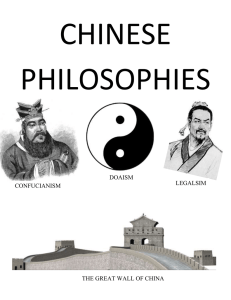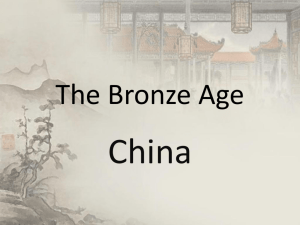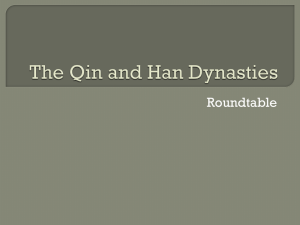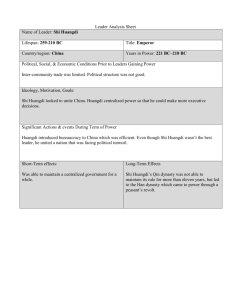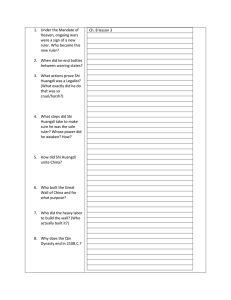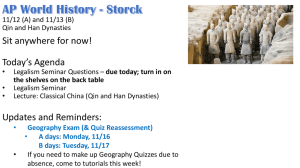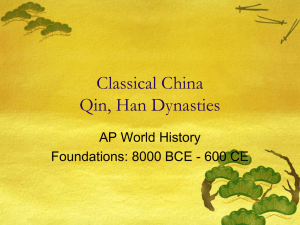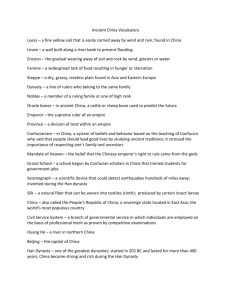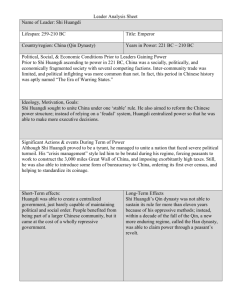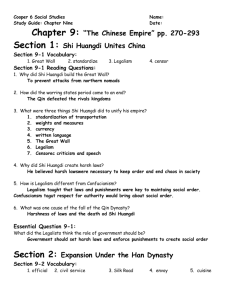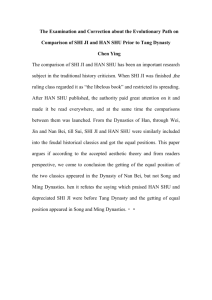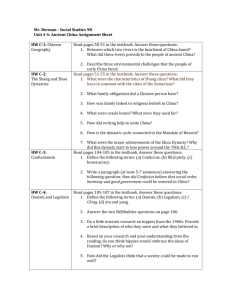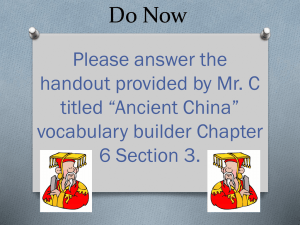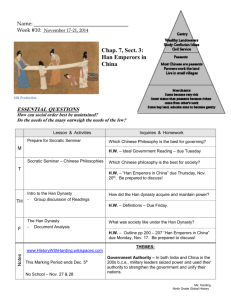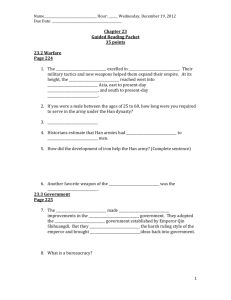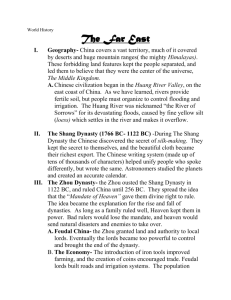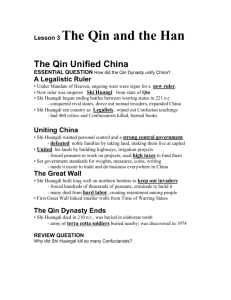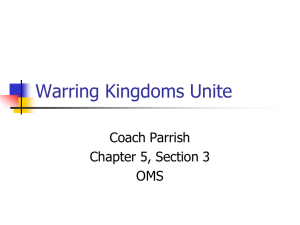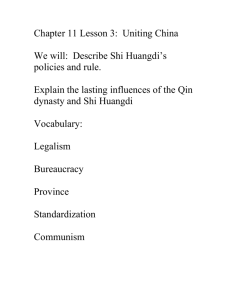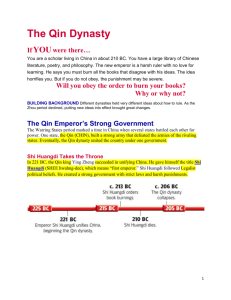world studies worksheet ch. 3, sec. 5: strong
advertisement
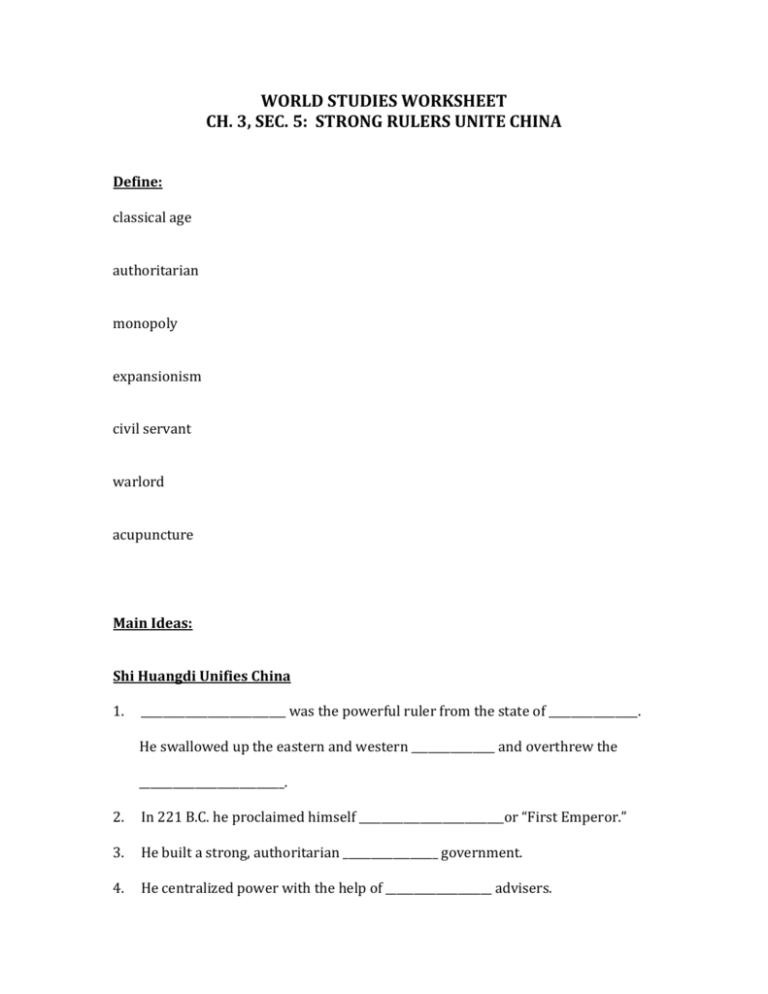
WORLD STUDIES WORKSHEET CH. 3, SEC. 5: STRONG RULERS UNITE CHINA Define: classical age authoritarian monopoly expansionism civil servant warlord acupuncture Main Ideas: Shi Huangdi Unifies China 1. __________________________ was the powerful ruler from the state of ________________. He swallowed up the eastern and western _______________ and overthrew the __________________________. 2. In 221 B.C. he proclaimed himself __________________________or “First Emperor.” 3. He built a strong, authoritarian _________________ government. 4. He centralized power with the help of ___________________ advisers. 5. Legalism was based on the teachings of _________________________. 6. Hanfeizi believed that the nature of man was basically ___________________. He believed ___________________ was the motive for most actions and the cause of most conflicts. 7. Hanfeizi believed that the only way to achieve order was to _______________________ _______________________________________________________________________________. 8. To Legalists, _____________________ was a ruler’s greatest virtue. 9. What did Shi Huangdi do to those who were critical of him? 10. Shi Huangdi approved a ruthless campaign of ______________________to end dissent. 11. Legalism included the policy of ___________________________ people for crimes. 12. Shi Huangdi also abolished ___________________________, which gave little allegiance from local rulers to the central government. He replaced the feudal states with _____________________________ and appointed loyal officials to administer them. 13. He forced ______________________________ to live in his capital at _______________________ 14. He gave the lands of the nobles to the _______________________________, but they had to pay __________________________ to support _______________________ and _______________________________________________. 15. To promote unity, Shi Huangdi did 3 things: a. b. c. 16. The _______________________ was his most costly achievement. Hundreds of thousands of _____________________ worked for years to complete it. Many workers died. 17. Why did people revolt after the death of Shi Huangdi? 18. The ________________ dynasty was formed when ______________________, an illiterate peasant leader defeated rival armies. The Han Dynasty Strengthens China 19. Gao Zu restored order and justice. He _______________ taxes and eased _____________ policies. He appointed ___________________________________________ as advisors and his policies created strong foundations for the ____________________ dynasty. 20. The most famous Han emperor, ___________________, took China to new heights. He strengthened the __________________________ and _______________________. He chose officials from ________________________________________________________________________ and trained them. 21. To strengthen the economy he improved canals and roads, set up granaries and imposed a government monopoly on ______________________________. This provided a source of income rather than putting taxes on peasants. 22. Wudi followed a policy of _________________________________ by increasing the amount of land under Chinese rule. 23. He also opened up a network of trade routes, later called the _____________________ that linked China to the ____________________.The Chinese got new products from other places and sent large quantities of __________________ westward. 24. Eventually the Silk Road stretched for ______________________, linking China to the _________________________________ in the Middle East. At the western end, trade was controlled by various peoples, including the ________________________. 25. Han emperors made _________________________________ the official belief of the state. They relied on well-educated scholars to run the _______________________________ government. A scholar-official was supposed to be a _____________________________. 26. Han emperors adopted the idea that ____________________________should win their positions by _________________, not family ties. Those in the Han civil service system would be ______________________ on their knowledge of government policy. 27. In theory, any man could take the exams, but in practice only those who could ___________________ the years of study could hope to succeed. 28. _____________________ were excluded from government jobs. 29. As the Han dynasty aged, court intrigues undermined emperors who could no longer control powerful ________________________. Things fell into disrepair. The peasants were burdened with heavy taxes and debt and many _________________. Many fled to the mountains and joined secret groups of bandits, known by colorful names, such as ________________________________________________________________ 30. In 220, ambitious warlords overthrew the last Han emperor and China broke up into several _______________________. Invaders began to come over the ____________________________and set up their own states. Some were absorbed into Chinese civilization. Achievements of the Han Golden Age 31. Because there were so many tremendous advances the Chinese later called themselves the ___________________________________________. 32. What did the Han find out about eclipses? 33. Many doctors promoted the use of ______________________________________to relieve pain. 34. Cai Lun invented a method for making ________________________ out of wood pulp. 35. Name 3 other inventions: a. b. c. 36. Buddhism became increasingly popular, especially in times of ___________________. 37. The appeal of Buddhism was the escape from ________________________________. 38. ________________________ Buddhism offered the hope of eternal happiness.
